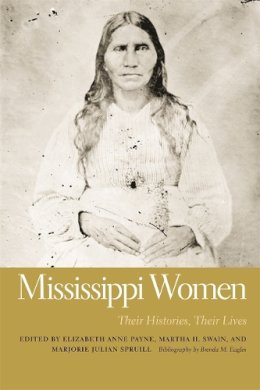
Mississippi Women: Their Histories, Their Lives, Volume 2 (Southern Women: Their Lives and Times)
Elizabeth Anne Payne, Martha H. Swain, Marjorie Julian Spruill, Brenda M. Eagles
Volume 1 of Mississippi Women enriched our understanding of women’s roles in the state’s history through profiles of notable, though often neglected, individuals. Volume 2 explores the historical forces that have shaped women’s lives in Mississippi. Covering an expanse of time from early European settlement through the course of the twentieth century, the essays in the second volume acknowledge the state’s diverse cultural and physical landscapes as they discuss how issues of race, gender, and class affected women’s lives in various private and public spheres.
Essays on the state’s early history focus on such topics as Choctaw and Chickasaw women’s influence on Native American society and tribal councils, daily life for free black women in slaveholding Natchez, and the efforts of white Protestant women to establish churches on the frontier. Several essays cast new light on legal concerns, including two on the pivotal Married Women’s Property Act of 1839, while other essays examine the impact of the Civil War and Reconstruction on women’s lives.
The boundaries of race and gender in Jim Crow Mississippi are explored through an essay on the women of the mixed-race Knight family, notably the educator, nurse, and missionary Anna Knight. Women’s experiences with rural electrification, consumerism, civil rights activism, social and service clubs, and feminism are among the other twentieth-century topics addressed in the essays. Volume 2 concludes with an essay on storytelling and remembrance that centers on the family of Pulitzer Prize-winning columnist (and Mississippi native) William Raspberry.
Product Details
About Elizabeth Anne Payne, Martha H. Swain, Marjorie Julian Spruill, Brenda M. Eagles
Reviews for Mississippi Women: Their Histories, Their Lives, Volume 2 (Southern Women: Their Lives and Times)
Journal of Southern History
Mississippi Women: Their Histories, Their Lives—Volume 2 includes vibrant chapters from a number of prominent scholars in the field of southern history as well as from those who are just bringing their work to light. With this second book, a smart complement to the first volume, the authors analyze the forces of history in the lives of Mississippi women while demonstrating women's agency in a sophisticated and analytical manner. From Choctaw and Chickasaw tribal history to the International Women's Year Conferences of 1977, Mississippi offers a fascinating window into the world of southern women.
Elizabeth Hayes Turner
author of Women and Gender in the New South, 1865–1945
I can't wait to assign the second volume of Mississippi Women to my classes. This book provides historical scholarship that can at once illuminate stories and novels by writers like Eudora Welty and Toni Morrison and offer new insight into literary texts by their male counterparts. The book's essays paint a portrait of Mississippi women—Native American, black, and white—which is relevant far beyond state lines or the boundaries of academic disciplines.
Suzanne Marrs
author of Eudora Welty: A Biography
The essays in this volume confound our assumptions about Mississippi women and broaden our understanding of southern womanhood in general. The authors capture the breadth and diversity of women’s experiences in the state from eighteenth-century Chickasaw and Choctaw women to nineteenth- and twentieth-century black and white women—all restricted by or challenging social, economic, and political constraints. This is an outstanding study of women’s history as southern history.
Beverly Greene Bond
editor of Tennessee Women: Their Lives and Times
This volume is for all of us. Beautiful and powerful writing makes these essays accessible to those of us outside the scholarly world of historians and the academy. As a former civil rights lawyer, law professor, and Women’s Rights Program Officer at Ford responsible for its grant-making globally and in the United States, I cannot say enough about how important this volume is.
Barbara Y. Phillips
Former Ford Foundation Program Officer for Women's Rights and Gender Equity
